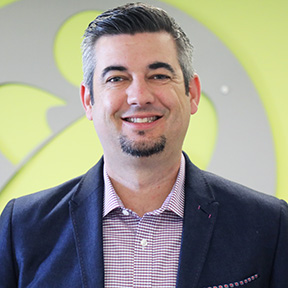
Christin Deacon, Director of Health Benefit Operations and Policy and Planning, State of New Jersey
On this episode of The 3rd Question we talk with Christin Deacon – Director of Health Benefit Operations and Policy and Planning for the State of New Jersey, as she discusses the top health care initiatives for the State and the factors that moved those priorities up to the top.
Video Transcript
Ryan James:
Hello and welcome to The Third Question. This is a video thought leadership series with public sector thought leaders from around the country. And today we are joined by Christin Deacon. Christin is the director of Health Benefit Operations and Policy Planning at the State of New Jersey. So Christin, thanks so much for joining us today.
Christin Deacon:
Good afternoon, and thanks for having me.
Ryan James:
Well it's morning still where I'm at-
Christin Deacon:
Oh, okay.
Ryan James:
So that's okay. So Christin, before we get into our three questions, why don't you give our audience a little bit of an introduction of who you are, what you oversee, in your role there at the state.
Christin Deacon:
Sure. So I'm, like you said, Christin Deacon and I consider myself a recovering attorney. I didn't grow up in health care or human resources. I was actually a corporate restructuring attorney for almost ten years, practicing in Delaware, Pennsylvania and New Jersey. Found myself in the Attorney General's office after that stint, where I then got tapped to work for the former governor and now the treasurer's office, where I stepped into the role of leading the health benefits operations for the state health benefits plan and the school employee health benefits plan.
Christin Deacon:
A little about our plan, we cover about 800,000 lives. So that's belly buttons--subscribers, dependents, retirees. We cover all state employees, including institutes of higher education in the state, as well as local government employees and school districts that elect to participate in the state health benefit program.
Ryan James:
So just a small group.
Christin Deacon:
Yes.
Ryan James:
All right, well, let's get into our questions. So my first question for you is this, as one of the main people who has been in charge of this transformation of the state of New Jersey's strategies, what were some of the top initiatives that you and the team focused on and what factors-- return on investment, process improvement, employee education? What are the factors that move those initiatives to the top of the list.
Christin Deacon:
Sure. I think one of the things that was on the top of my list was engagement and communication, which I think really go hand in hand. When you talk about factors that you should look at in evaluating your priorities, like you said--ROI, efficiency, et cetera--
all of those factors are premised on your ability to engage and communicate with your members effectively. I think it's a challenge in healthcare because we're largely accustomed as a society to think about our health coverage as something that's there only when you get sick or when you have an accident and have an acute issue and need care. But I think that, that thinking really has to change. If we're unable to engage our members, to keep them really in their best health and fully informed about their benefits, then we'll continue along the same path of really unsustainable spending and really miss an opportunity to help our members live their healthiest lives. So I think that's probably the number one priority, one of my number one priorities.
Ryan James:
Helping them engage with the education aspect of healthcare, yeah. I hear that a lot as I talk to organizations, it's how do they communicate to ... I mean, for what you just mentioned, all those groups that are underneath you are health plan, but there are smaller groups have that same challenge as well. Just the pure communication aspect with their members. So I hear that a lot.
Ryan James:
So with that, talking about that large group, with that large group of benefit consumers, you've been able to do some unique things and leverage that size with vendors and healthcare providers, to help control some of the cost aspects of benefits. I would love if you could share maybe just two or three of those things of how you've done that. But maybe also areas that you think any size public sector organization could take advantage to really control benefits spend, because it is, it's one of their top budget items.
Christin Deacon:
Right. I'll give a couple of examples and I'd be happy to share more with the audience, a greater audience at a later time, but the first would be a very unique RFP that we held, or procurement process for our TPA and network vendor in 2019. It included a couple of really unique features that I haven't yet seen in public procurement, at least with my peers. And that was, we were able to extract unit cost guarantees on a ZIP code, a three digit ZIP basis for hundreds of CPT codes and the most utilized DRG codes.
Christin Deacon:
And so, when I approached drafting this RFP, I really wanted to move away from that elusive discount off charges approach. How do we not only evaluate our bidders on an apples to apples basis, but then how do we hold them to that bid, year over year of the contract?
Christin Deacon:
So that was a really unique feature. We were able to get a really aggressive claims target guarantee, which doesn't transform it into a fully insured product, but it gives the vendor a little bit more incentive to keep claims cost under control. Another example that I think any size entity could use is we used a reverse auction to procure PBM services or pharmaceutical benefit manager services. That was credited over the course of two procurements with saving our plan approximately $2.5 billion over six years. That's with a B, it's a lot of money.
Christin Deacon:
So that was really innovative. And I've seen a lot of interest actually in other public sector of using that reverse auction mentality, not just in PBM procurement, but across the board. Really putting vendors against vendors to compete for your business, as opposed to the typical public procurement process.
Christin Deacon:
Think about joining a cooperative purchasing arrangement. Again, public procurement can really dog down progress in moving nimbly and quickly. Cooperative purchasing alliances really open up a whole new window of opportunity for onboarding vendors quickly, efficiently and in a cost effective way.
Christin Deacon:
I would say finally, the most important thing to control costs is to always approach an issue in healthcare, for me it's always one question in mind and that's "are our financial incentives aligned?" So for example, I'm just going to give a quick example--one might think that your TPA network provider, it would be in their interest to reduce out of network spend and utilization because it's better for everybody, right? They want to move people in network. And so that might seem true on the surface, but if you dig a little deeper and look at your contracts, see what percentage of those out of network ... if they're negotiating an out of network charge down by 20%, what percent of that savings are they taking? Right? And so again, just always come at it from a perspective of "where are the financial incentives aligned?" and I think when you approach a question or an issue with that question in mind, you'll be much better equipped to find the right solution.
Ryan James:
It's interesting. Well, I'm going to cheat and I'm going to ask a mini second question here, part B of the question. So you also have done a lot of things. You mentioned what some of the initiatives are around employee education. What have you been able to do in that aspect, helping communication for the state?
Christin Deacon:
I think one of the most important things that we're in the process of doing right now, and we'll be live for 10/1 open enrollment is moving our applications platform online. And by doing so, I've seen folks that are signing up for our plans and they have to have a six foot wide table with spreadsheets and plan comparison charts and percentage of salary versus percentage of premium. In no other industry are you having to navigate these types of literally life changing decisions with such little help and information at your fingertips. I can book a trip around the world easier than I can pick my health plan, right?
Christin Deacon:
So, in integrating the benefit platform through Businessolver, it's going to walk our members step by step through the plan, through their plan options. I think healthcare literacy is just so important and it's something that's scary for folks because it's not fun and they don't want to pay attention to it until they're sick and they're having to care for a loved one and go through hundreds of pages of EOBs. But we can't be scared of it. And going back to that engagement, until we're able to earn the trust of our members and get them to engage proactively and feel empowered in their healthcare, we have a long road ahead.
Ryan James:
Got that. All right. Well, we've made it to the third question, even though I cheated a little bit. I have a couple of time travel devices here on my back shelf that our audience doesn't see, but I'm picking for you today. The DeLorean from a favorite movie of mine, Back to the Future, was just on TV the other day and I watched a few minutes. I won't lie. So Christin, if I was to give you the DeLorean and you were able to go back in time to some point of your public sector career, I know you say you're a recovering lawyer, but if you could go back and you could tell yourself something or change something, what would it be and why?
Christin Deacon:
So I'm going to cheat, as well. I'm not going to give you the answer that you're looking for. And I know it sounds trite, but I'm a firm believer that all of the challenges and failures and forks in the roads and missteps or progress, they're all part of this journey that takes you to where you are. And so I really wouldn't change a thing. I'm enjoying the path that I'm on and really excited for the future, for what lies ahead for me and health care in general. Because I think it's ripe for disruption, and I consider myself a disruptor.
Christin Deacon:
That being said, and in order to be a good sport, I do think that there's some advice that I could have benefited from, and that I think other young professionals and particularly female, aspiring executives would benefit from. And that is to take control and ownership over your professional path. And that means expressing yourself assertively and firmly and being an advocate for your own interests, right? I always have to remind myself that nobody is looking out for me, but me. And so whether it's negotiating a salary increase or trying to get ahead, being timid or hesitant, is unlikely to get you what you want. So the more you project confidence and competence, the more you'll be able to build confidence in your abilities and that'll help you on your journey.
Christin Deacon:
I also watched Back to the Future too, the other day with my son, and he thought it was a great movie. We've been resurrecting the old classics while stuck at home.
Ryan James:
Well, I love it. I love it. I appreciate you being on and I think that is great advice. As a father of a little girl, that's something I try and instill in her, even as a six year old. Sometimes she acts a little too confident for a six year old, but it's okay.
Christin Deacon:
I always have to remind myself with kids that the most challenging and I think it was true for myself--the most challenging features that our kids have as children as parents, those are going to be the traits that distinguish them and separate them from the pack. So if you can harness it and use it for good, that feistiness is going to get her far in life.
Ryan James:
Awesome. Well, Christin, thank you so much for joining us on The Third Question today. If any of our viewers want to see any other interviews with thought leaders or notified when more come out, you can subscribe at thethirdquestion.com. We really appreciate your time and have a great week.
Christin Deacon:
Thanks.
Ryan James:
Bye.

